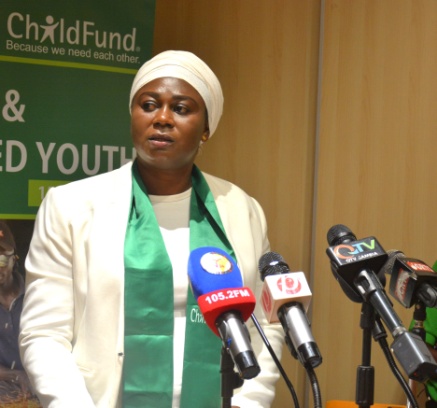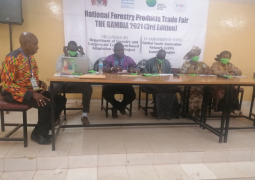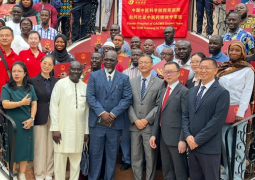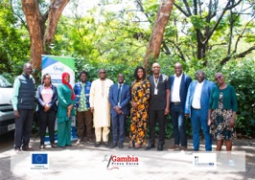
According to The Gambia Multiple Indicator Cluster Survey (2018), there is limited adult engagement with children (2 – 4 years old) in activities that promote learning and school readiness.
These are alarming statistics because parents and caregivers have an important role to play in their children’s development. But many do not know this, and unless they understand and have the required knowledge and skills about the developmental needs of their children, they can’t build strong relationships with the children to bring about positive interactions.
The key factors affecting children’s development include responsive nurturing caregiving, safe supportive environment and appropriate nutrition and stimulation. Addressing these factors provides a good start for all children, which is beneficial for their development.
Psychologist Lawrence Cohen points out that play is children’s way of exploring the world, communicating deep feelings, getting close to those they care about, and working through stressful situations.
Evidently, when we engage with our children positively, we are assured of maintaining a sense of peace and harmony in our homes, thereby enhancing the full realisation of children’s creative potential and development.
But how do we achieve this as parents and caregivers? Through play.
It is only through play with our kids that parents and caregivers join children in their world, focusing on connection and confidence.
In a bid to promote responsive parenting, ChildFund implemented a responsive and protective parenting program dubbed “Playful Parenting program” in Nianija district, Central River Region North of The Gambia between May 2021 and June 2022.
The project funded by the World Bank Group is a component of the Social and Behavioural Change Communication (SBCC) of the “NAFA” Social Safety Net Project.
The World Bank Group, well recognised internationally for its development support to nations and organisations, especially in early childhood development, thus, funded this parenting project, successfully implemented by ChildFund.
By its completion in June 2022, the project had reached 32 communities across the district, and benefitted one thousand two hundred children.
The parenting program has empowered parents and other primary caregivers to give children a strong start in life.
Some of the participants who recounted their experience on the documentary produced as part of the project and titled “Playful Parenting in The Gambia: A Tiny Rural Community’s Experience,” say they now understand the importance of engaging and playing with children.
They said the program has brought about positive change towards the way they bring up their children now. For instance, some said before attending the parenting education sessions, they used to beat their children and did not have time to be with them.
But now they have stopped the abuse and are spending more time with their children.
Male parents and caregivers who played little role in caring for children also said that they are now closer to their children and are communicating with them using the new skills they learnt from the parenting program.
Fathers now help their wives in caring for the children and make toys for them from safe local materials at home. Some of them even clean the babies and take them to the clinic, roles that men in Nianija and many parts of The Gambia are entirely assigned to women.
Participants are also aware of how to prepare and preserve clean and nutritious food for their children after attending the parenting sessions. This newly acquired knowledge will no doubt keep children healthy and will improve their growth and well-being.
In 2018, ChildFund also implemented a project on parenting education for Early Childhood Development in three regions: Lower River, North Bank and Central River Regions. The project funded by UNICEF, provided training for 1200 young parents in 30 communities, addressing specific parenting and nurturing care skills of participants including single mothers.
ChildFund earlier began implementing parenting programs with its Local Partners: Foni Ding Ding, Ding Ding Yiriwa and Saama Kairo Federations in several communities in our areas of operation in the West Coast Region. This has resulted in significant improvement in early childcare for children living in this area.
We in the process have gathered valuable experience in giving children a great start in life, and we will continue to work with our partners to replicate the successes achieved in other parts of the country.
ChildFund, meanwhile, adopted the strategy of knowledge transfer by working with the Department of Community Development, as well as members of the communities where we implement our parenting programs to ensure sustainability when these projects phase out.
Let me at this point call upon all duty bearers, as well as parents and other caregivers to invest in the development of children at the start of their infancy through playful parenting.
When we do, according to ECD experts, we would guarantee children improved care and protection, better health and nutrition outcomes and reduced stress associated with living in adverse conditions. They will then be more likely to survive, enjoy a happy childhood and thrive.
In the long term, playful parenting helps increase academic learning, builds language development, and increases imagination and creative skill development. Children are also likely to share with their parents what’s happening to them as they grow older.
But children are not the only beneficiaries in the interaction with their caregivers because ECD experts believe parents who engage their kids in child-directed play are more productive, more creative, less stressed, and therefore, less prone to burn out over long haul.
Thanks to the World Bank Group, ChildFund and the NAFA program, caregivers of children in Nianija are among the latest to benefit from playful parenting in The Gambia, and there is no doubt that this achievement will provide these children a strong start in life.





